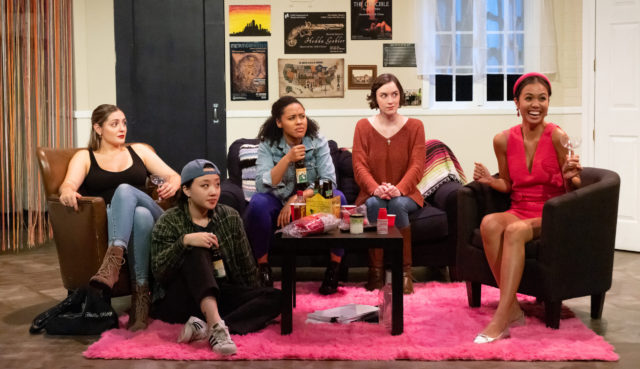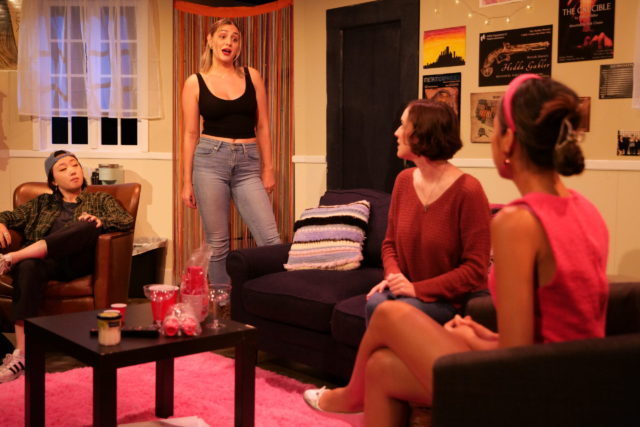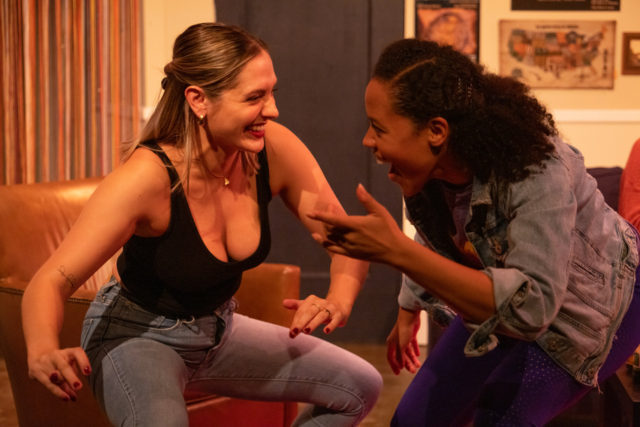
Five theater students discuss their upcoming production of the Scottish play in macbitches (photo by Wesley Volcy)
macbitches
Chain Theatre
312 West Thirty-Sixth St. between Eighth & Ninth Aves.
Wednesday – Sunday through September 10, $25
www.chaintheatre.org
One of the most iconic images of theater itself is that of Janus, the two-faced Roman god of beginnings and endings, sometimes depicted as happy on one side and sad on the other. Every play, of course, has a beginning and an ending, but it’s not always clear when a show starts, and too many works seem to be unable to find a satisfying conclusion. Such is the case with the world premiere of Sophie McIntosh’s aptly titled macbitches, running at the Chain Theatre through September 10.
As the audience enters the space, two characters are onstage, one embroidering, the other impatiently checking her cellphone. Is the play happening? Most audience members sat down, took out their own cellphones, engaged in conversation with their companion(s), or closed their eyes and rested, ignoring what was happening onstage. A few moments later, two more characters arrived through a side door and hung out in the area between the audience and the stage, one looking for someone, the other reading a book. Had the play begun? Few people in the audience paid attention; even the people sitting right in front of these two new characters, who were practically in their laps, remained glued to their phones.
A few of us took advantage of the activity and followed the actors while also exploring the set, a well-decorated living room in a dorm, with small posters of such plays as Hedda Gabler, The Crucible, and Metamorphoses in addition to a giant poster of Russian-American actress, director, producer, and screenwriter Alla Nazimova. A mood was being created and we were getting a feel for the characters through their facial gestures and movements, but the majority of the audience chose not to notice any of that until the lights went down, at which point there could be no argument: The show was underway.

Rachel LaBeau (Caroline L. Orlando) shares her thoughts on theater and Shakespeare in world premiere (photo by Wesley Volcy)
Sophomore Piper Bell (Laura Clare Browne), junior Cam Witkowski (Morgan Lui), and seniors Alexis “Lexi” Lapp (Natasja Naarendorp) and Rachel LaBeau (Caroline L. Orlando) have gathered, anxiously awaiting the call board announcing who will be playing which role in the Minnesota college’s upcoming production of Macbeth. Rachel is fully expecting to be Lady Macbeth, having previously portrayed Hedda Tesman in Hedda Gabler, Janet Van de Graaff in The Drowsy Chaperone, Olivia in Twelfth Night, and Abigail Williams in The Crucible; Lexi is anticipating a key role as well, while Cam and Piper are eager for meaty supporting parts. But they all end up disappointed and more than a little surprised when unknown freshman Hailey Hudson (Marie Dinolan) from a small town in Indiana snags Lady M.
In order to find out who Hailey is, Rachel and Lexi decide to have a small get-together, inviting her to their dorm room. Piper, a perpetually upbeat virgin who grew up in a very Christian family, seems genuinely happy for Hailey, an adorable young woman who likes to say “cool” a lot.
“You must be so excited,” Piper says. “I am! Like literally so stoked,. I already told my parents and they’re gonna come see the show both weekends. They’re like really proud,” Hailey responds. “I’m proud! Oh man, when I gave you your tour last spring, I knew I had a good feeling about you and now look at you! Out there getting the lead your first semester!” Piper exclaims.
But Rachel and Lexi do not share Piper’s enthusiasm, for a few reasons. When Hailey, who refers to Macbeth as “Maccers,” says, “It’s not like Shakespeare is like totally pure . . . I mean, he probably wasn’t actually a real person, right?” Rachel nearly explodes. “Do not tell me you’re an Anti-Stratfordian,” she rages. “People who preach that Shakespeare could never have written his plays because he wasn’t educated enough or well-bred enough or whatever are ignorant, privileged pseudo-scholars who don’t want to believe that true art, true genius can come from anyone.”
Soon Rachel and Lexi are plying the innocent Hailey, who clearly is not enjoying her cosmo, with shots of Fireball and Svedka to help them pull off a devious plan.

Best friends Rachel (Caroline L. Orlando) and Lexi (Natasja Naarendorp) concoct a mean plan in macbitches (photo by Wesley Volcy)
Most of macbitches could pass the Bechdel test; although the five women talk about men — from classmates to the two school theater directors, Arik, who helms the plays, and Martin, who guides the musicals — it’s the ladies who are in charge of the narrative. In a way, they all have a version of Lady M inside them, making their own decisions as they search their desires.
But then the story turns on a dime, throwing everything that came before it under the bus as Rachel and Lexi become mean girls who seriously threaten Hailey. While it was clear that the two roommates had an ulterior motive for inviting Hailey over, what they aim to do is so extreme that it is difficult to believe. The play up till then had been thoroughly engaging, with well-drawn characters, excellent acting, smooth direction, and no men, reminiscent of Sanaz Toosi’s recent Wish You Were Here, about five close female friends in Iran, as well as Erica Schmidt’s ingenious 2019 Mac Beth for Red Bull, in which seven students at an all-girls school put on a contemporary version of the Scottish play.
While McIntosh (Ipswich, cityscrape), who is in Columbia’s MFA writing program, and director Ella Jane New (Chasing the River, Six Corners) raise important issues of misogyny, abuse, and harassment, the ending feels like it should be part of a different play. There was a moment that I thought the show would be over, and I would have found that satisfying, but the next scene, though meant to be shocking — not unlike the conclusion of Macbeth — instead was upsetting and disappointing. In Schmidt’s Mac Beth, women grab the power; in macbitches, they give it back.